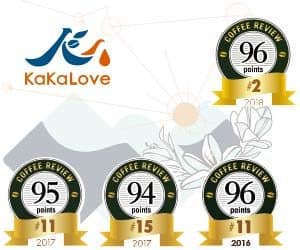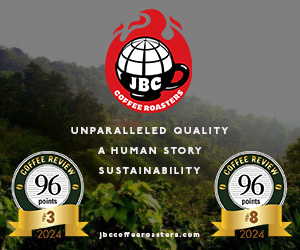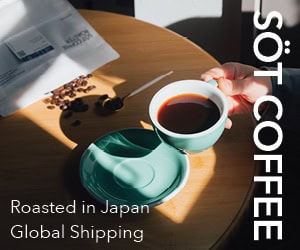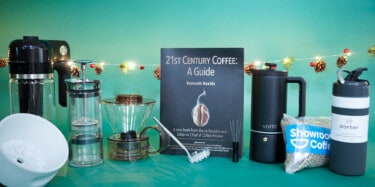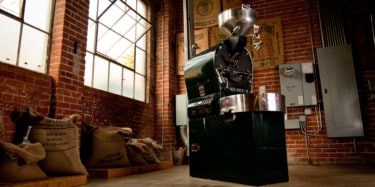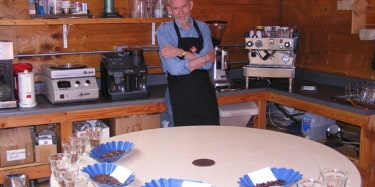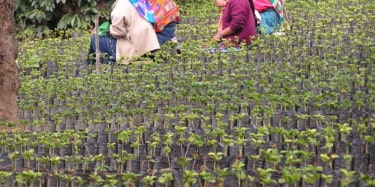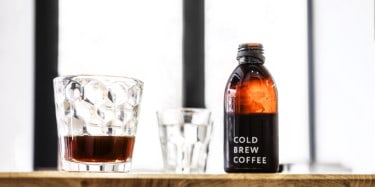When’s the last time you walked into a coffee shop and didn’t see at least one non-dairy milk option? While oat, almond and soy milks are commonly found on café menus, there’s also a surge of other non-dairy milks — from macadamia nut to flax seed — in countless formulations designed for coffee, smoothies and other beverages. While we test hundreds of espressos each year, our standard method is to
SEARCH RESULTS
Colombia Wilton Benitez Double Anaerobic Thermal Shock Yellow Gesha
Produced by Wilton Benitez of La Macarena Farm, entirely of the Yellow Geisha variety of Arabica, and processed by a complexly detailed version of the double-anaerobic method (sealed-tank fermentation of the whole fruit with the addition of brewer’s yeast, removal of skin and pulp, and a second fermentation of the beans shut in the tank with the removed skin and pulp). Additional processing nuance
Sunburst Cold Brew
A whole-bean coffee sourced and roasted for cold brewing at home. For this review brewed at the Coffee Review lab using the Toddy Small-Batch Artisan Brewer (45 g. coffee to 500 ml. water, 24 hour soak) and tested chilled, but without ice. Sunburst Cold Brew is a seasonally rotating blend of coffees. This version combines JBC’s Cumba #3 Burundi and Colombia Praga, both washed coffees. JBC Coffee
Colombia Cauca Granja Paraiso 92 – Pink Bourbon
Produced by Wilton Benitez of Finca El Paraíso entirely of the rare Pink Bourbon variety of Arabica, and processed by a complexly detailed version of the double-anaerobic method (sealed-tank fermentation of the whole fruit with the addition of brewer’s yeast, removal of skin and pulp, and a second fermentation of the beans shut in the tank with the removed skin and pulp). Additional processing
Colombia Osmanthus Bouquet Granja Paraiso 92
Produced by Wilton Benitez of Finca El Paraíso entirely of the rare Pink Bourbon variety of Arabica, and processed by a complexly detailed version of the double-anaerobic method (sealed-tank fermentation of the whole fruit with the addition of brewer’s yeast, removal of skin and pulp, and a second fermentation of the beans shut in the tank with the removed skin and pulp). Additional processing
Everything But the Beans: Coffee Gear Gifting Guide for the Holidays
If Black Friday passed you by, black coffee can save the day, as both fuel and theme for holiday gift shopping. Besides all of the splendid coffees reviewed here, the unprecedented boom in new coffee brewing tools and accessories entering the market over the past couple of years has made it easier than ever to bring more excitement to a well-crafted cup, be it your own or a loved
Ethiopia Botabaa
Southern Ethiopia produces distinctive coffees from largely indigenous, traditional selections of Arabica long grown in the region. Coffees like this one, processed by the traditional wet or washed method (fruit skin and pulp is removed before drying), typically express great aromatic complexity and intensity. Evie’s Café, based in Chia-Yi Taiwan, specializes in fine roasted coffees as well as
Sticking with the Classic: 8 Coffees from Southern California Roasters
The ever-evolving world of specialty coffee continues to see rapid growth in the area of product differentiation, with a strong emphasis on processing innovation at the farm level. In the last decade or so, as the story of each individual coffee has become more important to the consumer, it is variation in processing method that seems to get the most attention. Perhaps that’s because
Reflections on the Art of Coffee Blending: Daily Drinkers With Personality
The idea of the coffee blend is a long and winding road. Blends give roasters an opportunity to create a coffee that evokes specific sensory properties, and blends are often designed to give consumers a consistent experience over time (much like a Champagne house approaches the non-vintage brut). But before consumers began insisting upon knowing the origins of what’s in their cup, it wasn’t all
The World and the Cupping Table: 25 Years of Change at Coffee Review
Coffee Review has been reviewing coffees and reporting in depth on the world of specialty coffee since 1997, making this our 25th year of slurping, spitting and writing. Over those 25 years, we have published reviews of thousands of coffees, tasted tens of thousands more, and produced more than 250 in-depth monthly reports on coffee growing regions, processing methods, tree varieties,
Kenya Kirinyaga
Despite grower discontent, unclear government coffee policy and urban encroachment on prime coffee lands, the famed Kenya coffee auction system and its participating cooperatives continue to produce some of the world's most elegant and distinctive coffees. Evie’s Café, based in Chia-Yi Taiwan, specializes in fine roasted coffees as well as pour-overs and cold brews. Visit
Tradition, Diversity & Measured Innovation Elevate Guatemala Coffees
While some people in the specialty coffee industry still refer to the “classic Central America cup,” effectively lumping together the diverse coffee-producing countries of Guatemala, Honduras, Nicaragua, El Salvador and Costa Rica, it is more the trend now to make increasingly fine distinctions among these origins in terms of varieties, processing, and cup profiles specific to each. Single-origin
Cold Black Coffee: Simplicity Rules the Post-Pandemic RTD Landscape
While so much in the world of coffee gets “curiouser and curiouser” each year, to echo the protagonist of Lewis Carroll’s Alice in Wonderland — from increasingly complex, mysteriously named green coffee processing methods to new hybrid varieties of Arabica born of necessity to respond to climate change — specialty coffee is a living entity, its success defined by an ability to adapt, both to
Brazil Ipanema Golden Edition C26 Lychee
The coffee tied for the highest rating in a tasting of ready-to-drink black coffees for Coffee Review’s July 2021 tasting report. Prepared by the cold-brew method, which involves prolonged steeping of ground coffee in cold water. Contains no additives or ingredients other than coffee and water. The green coffee used is a natural-processed Yellow Caturra from Fazenda Rio Verde in Brazil that is
Ethiopia Mormora Cold Brew
The coffee tied for the highest rating in a tasting of ready-to-drink black coffees for Coffee Review’s July 2021 tasting report. Prepared by the cold-brew method, which involves prolonged steeping of ground coffee in cold water. Contains no additives or ingredients other than coffee and water. The green coffee used is a natural-processed Ethiopia Mormora. Roast House is a small-batch,
Ethiopia Blend Cold Brew
The coffee tied for the second-highest rating in a tasting of ready-to-drink black coffees for Coffee Review’s July 2020 tasting report. Prepared by the cold-brew method, which involves prolonged steeping of ground coffee in cold or room-temperature water and subsequent filtering. Contains no additives or ingredients other than coffee and water. The green coffee used is a blend of two Ethiopias,
Black Cold Brew
The coffee tied for the second-highest rating in a tasting of ready-to-drink black coffees for Coffee Review’s July 2021 tasting report. Prepared by the cold-brew method, which involves prolonged steeping of ground coffee in cold or room-temperature water and subsequent filtering. Contains no additives or ingredients other than coffee and water. The green coffee used is a blend of washed-process
Kyoto Iced Coffee
The coffee tied for the second-highest rating in a tasting of ready-to-drink black coffees for Coffee Review’s July 2021 tasting report. Dripdash brewed and canned the coffee. The brewing was conducted using a cold brewing method in which ice-chilled water drips through a bed of ground coffee over the course of several hours per batch. Contains no additives or ingredients other than coffee and
Kenya Cold Brew
The coffee tied for the second-highest rating in a tasting of ready-to-drink black coffees for Coffee Review’s July 2021 tasting report. Prepared using a Yama cold-drip tower, a painstaking cold brewing method in which ice-chilled water drips slowly through a bed of ground coffee over the course of several hours per batch. The green coffee used is a single-origin Kenya. Contains no additives or
Dead Reckoning
The coffee tied for the second-highest rating in a tasting of ready-to-drink black coffees for Coffee Review’s July 2021 tasting report. Prepared by the cold-brew method, which involves prolonged steeping of ground coffee in cold or room-temperature water and subsequent filtering. Contains no additives or ingredients other than coffee and water. Infused with nitrogen when canned. The green coffee





